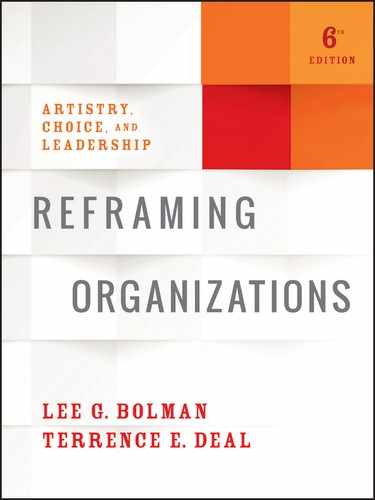Part Four
The Political Frame
When you ponder the word politics, what images come to mind? Are any of them positive or helpful? For many people, the answer is no. Around the globe, politics and politicians are widely despised and viewed as an unavoidable evil. In organizations, phrases like “they're playing politics” or “it was all political” are invariably terms of disapproval.
Similar attitudes surround the idea of power, a concept that is central in political thinking. In her last interview, only days before she was assassinated in December 2007, Benazir Bhutto was asked whether she liked power. Her response captured the mixed feelings many of us harbor: “Power has made me suffer too much. In reality I'm ambivalent about it. It interests me because it makes it possible to change things. But it's left me with a bitter taste” (Lagarde, 2008, p. 13).
A jaundiced view of politics constitutes a serious threat to individual and organizational effectiveness. Viewed from the political frame, politics is the realistic process of making decisions and allocating resources in a context of scarcity and divergent interests. This view puts politics at the heart of decision making.
We introduce the elements of the political frame in Chapter 9. We begin by examining the dynamics lurking behind the tragic losses of the space shuttles Columbia and Challenger. We also lay out the perspective's key assumptions and discuss basic issues of power, conflict, and ethics.
In Chapter 10, we look at the constructive side of politics. The chapter is organized around basic skills of the effective organizational politician: setting agendas, mapping the political terrain, networking, building coalitions, and negotiating. We also offer four principles of moral judgment to guide in dealing with ethically slippery political issues.
Chapter 11 moves from the individual to the organization. We look at organizations as both arenas for political contests and active political players or actors. As arenas, organizations play an important role in shaping the rules of the game. As players or actors, organizations are powerful tools for achieving the agenda of whoever controls them. We close with a discussion of the relative power of organizations and society. Will giant corporations take over the world? Or will other institutions channel and constrain their actions?
